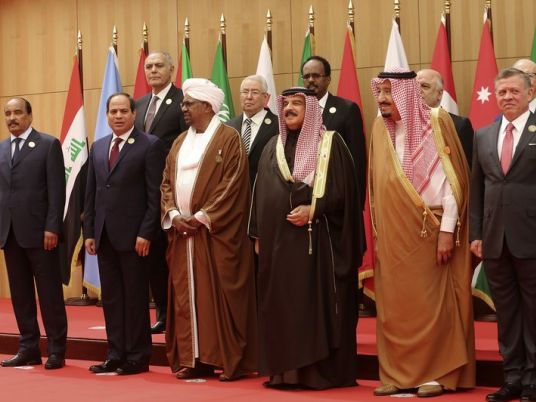
Arab leaders on Wednesday relaunched a peace plan that offers Israel full ties in exchange for Palestinian statehood, signaling to President Donald Trump that they are ready to engage if he tries to broker a broader Mideast peace.
Host Jordan said the one-day Arab summit held on the shores of the Dead Sea sent a "message of peace" — though one that could put new pressure on Israel to withdraw from lands it occupied in the 1967 Mideast war.
The gathering came ahead of White House meetings in coming weeks between Trump and three Arab leaders — Jordan's King Abdullah II, Egyptian President Abdel-Fattah al-Sisi and Palestinian President Mahmoud Abbas. The trio met on the sidelines of the summit to consolidate positions ahead of the White House meetings, officials said.
Trump hasn't yet formulated a policy on the Israeli-Palestinian conflict, but has said he is eager to broker a deal. His initial comments, including a campaign promise to move the US Embassy in Israel to contested Jerusalem and suggestions that there are alternatives to a two-state solution, caused alarm among some Arab leaders.
However, an embassy move no longer appears imminent, and some Trump administration officials have since endorsed the two-state solution.
Trump's international envoy, Jason Greenblatt, attended the summit and held talks with Abbas and the foreign ministers of Jordan, Egypt and Qatar.
Greenblatt affirmed Trump's belief that an Israeli-Palestinian deal "is not only possible, but would reverberate positively throughout the region and the world," the US Embassy in Jordan said. The envoy focused on making tangible progress, a statement said.
In reaffirming the 2002 Arab Peace Initiative, the summit undercut Israel's proposal of a regional peace in which normalization with some Arab countries would precede a deal with the Palestinians. Abbas has vehemently opposed this idea, fearing it would further weaken Palestinian negotiating positions.
The Palestinians want to set up a state in the West Bank, Gaza Strip and east Jerusalem, lands Israel captured in 1967.
Israeli Prime Minister Benjamin Netanyahu has said he is willing to negotiate the terms of Palestinian statehood, but rejects a partition of Jerusalem and, like his predecessors, has expanded Israeli settlements on occupied lands.
Netanyahu has not formally abandoned his stated support for the two-state solution, but has stopped mentioning it in his speeches since Trump was elected. Instead, he has made vague statements about seeking a region-wide peace agreement.
Israeli Cabinet minister Israel Katz suggested after the summit ended that Israel is ready to cooperate with Arab states, including in countering shared security threats, while "also advancing initiatives to improve the conditions of the Palestinians" in the West Bank and Gaza.
Katz said that a positive change in the regional climate "could lead in the future to peace."
Katz made no reference to the Arab peace plan, which was first launched in 2002. In the past, Israel has balked at the plan's proposed scope of withdrawals and its call for a "just settlement" of the Palestinian refugee problem.
Jordanian Foreign Minister Ayman Safadi said the summit signaled the Arab world is willing to engage with the Trump administration in efforts to negotiate a two-state deal. He said the Israeli-Palestinian conflict remains a root cause of Mideast tensions, and that resolving it would boost the fight against terrorism.
The summit's closing statement said "peace is a strategic option" for Arab states.
The declaration also highlighted the importance of Jerusalem to the Arab world.
Close to 40 percent of the city's residents are Palestinians. Jerusalem is home to a major Muslim-run site — the Al Aqsa Mosque compound — that is also revered by Jews as their holiest site and home of their biblical Temples.
The statement urged countries around the world not to move their diplomatic missions in Israel to Jerusalem — another signal to Trump.
Most countries, including the US, have not recognized Israel's annexation of east Jerusalem and keep their embassies in the Israeli coastal metropolis of Tel Aviv.
The summit affirmed long-held positions of Jordan, which has a large Palestinian population and also serves as custodian of the Al Aqsa compound.
The consensus on the Palestinian issue also served as a showcase for Arab unity in a fractured region, where leaders find themselves on opposite sides of long-running conflicts, particularly Syria's six-year-old civil war.
The 21 kings, presidents and top officials gathered on the Jordanian side of the Dead Sea, had a clear view from the summit's venue to the Israeli-occupied West Bank on the opposite shore.
Despite demands for urgent political reform to tackle the region's challenges, including high unemployment and widespread gender inequality, the optics of the summit signaled business as usual. The leaders around the table were all men, most of them elderly.
Syrian President Bashar Assad was absent — he hasn't been invited since Syria's suspension from the 22-member Arab League following his crackdown on a 2011 uprising that quickly turned into a brutal civil war.
Meanwhile, there were signs that Egypt and Saudi Arabia were making progress toward easing tensions that have been simmering for months.
During the summit session, the Egyptian president and Saudi Arabia's King Salman slipped out of the summit session for face-to-face talks.
Ahmed Aboul-Gheit, the head of the Arab League, later said that Salman invited Sisi to visit Saudi Arabia.
Saudi Arabia is a leading supporter of the Syrian opposition, while Egypt, fearful of Islamic militants among the rebels' ranks, has pushed for a political solution that might keep Assad in power.




